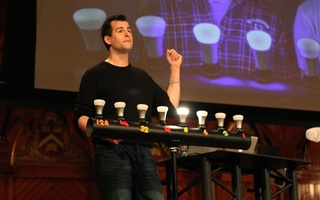The Real Thing
Since the software not only compares code but also scans other parts of the assignment--including verbal responses--it often catches plagiarism that is not even in the code portion of the assignment.
"It looks for any similarities, and there are different parts to the problem sets," says a student in Pforzheimer House who was required to withdraw from Harvard for a year after the Ad Board decided he had plagiarized a portion of a CS50 assignment.
"There's another part [of the problem set] that asks questions about the assignment," he says. "I borrowed a friend's paragraph and used it. The program picked it up."
He points out that other courses at Harvard don't have a sophisticated method for finding out just how much collaboration goes into a problem set.
"Students copy from each other all the time," he says. "[But] other problem sets are handed in informally to TFs. There is no one program that goes through them, and it's not like one person or entity has the chance to compare assignments."
He agrees that there is merit to the program, but he says until the program is expanded to other courses, the discrepancy in grading methods might just be unfair.
Read more in News
Gore, Bush Seal Nominations With Huge WinsRecommended Articles
-
Cut And Paste, Catch CheatersThe Internet has become the answer to cheaters’ prayers, diminishing any chance that professors might have to identify plagiarized source
-
Fighting Plagiarism, Schools Go High-TechWhat makes Kaavya Viswanathan ’08 unusual is not the fact that she plagiarized passages from another author’s work—it’s the fact
-
Pilot Program Takes Aim at PlagiarismInstructors in one sociology course will use anti-plagiarism software to catch copycats in their class, as part of a new
-
Professors Ask Computers to Catch CheatingProfessors are more widely employing algorithms, from decades-old codes to ones created by instructors, as an automated means to detect plagiarism in student assignments.
-
 Under CS50 Policy, Accused Students Likely Left in Dark
Under CS50 Policy, Accused Students Likely Left in Dark













